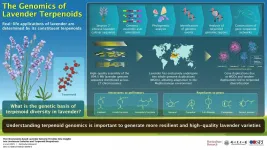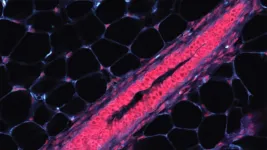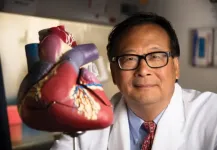Novel monoclonal antibody can substantially lower triglycerides in patients with acute pancreatitis
2021-05-16
(Press-News.org) The investigational drug evinacumab reduced triglycerides in patients with severe hypertriglyceridemia (sHTG) and a history of hospitalizations for acute pancreatitis in a phase 2 global study led by Mount Sinai. The fully human monoclonal antibody produced sustained reductions in triglyceride levels of up to 82 percent, depending on the patient's genotype, while also lowering the risk of recurrent acute pancreatitis. The results of the study will be presented as a late-breaking clinical trial at the American College of Cardiology (ACC) Annual Scientific Session, on May 16.
"Evinacumab has the potential to not only lower triglycerides, but the risk of acute pancreatitis, quality of life, and the risk of cardiovascular events in a highly vulnerable patient population," says Robert S. Rosenson, MD, Professor of Medicine at the Icahn School of Medicine at Mount Sinai, and lead investigator of the study. "The unmet clinical need couldn't be greater. Even after the current therapeutic options of dietary counseling, fibrates, and omega-3 fatty acid products, many individuals with severe hypertriglyceridemia have elevated triglyceride levels above 500 mg/dL, and some in the thousands."
Severe hypertriglyceridemia, defined as triglycerides greater than 500 mg/dL, is believed responsible for around 10 percent of all cases of acute pancreatitis which affects more than 200-thousand patients a year in the United States. It is an inflammatory condition of the pancreas that causes abdominal pain and fever and, in some individuals, can be life-threatening. Recurrent acute pancreatitis typically requires frequent hospitalizations and the most common causes are gallstones and alcoholism.
In their study of 52 patients with severe hypertriglyceridemia, researchers found that clinical improvements depended on genetic variants. The greatest triglyceride reductions, up to 82 percent, occurred in a cohort of patients without two mutations in the lipoprotein lipase (LPL) pathway. LPL is an enzyme responsible for metabolizing, or breaking down, triglycerides. In a second cohort of patients with a genetic disorder known as multifactorial chylomicronemia syndrome (MCS)--which can be exacerbated by comorbidities, medications, and even lifestyles--triglycerides were reduced by around 65 percent. And in a third cohort--of those with loss of function mutations in two genes encoding lipoprotein lipase, a condition known as familial chylomicronemia syndrome (FCS)--there was no reduction in triglyceride levels.
"Our research underscored the importance of genetic testing of the LPL pathway to determine which patients are most likely to respond well to evinacumab therapy," says Dr. Rosenson, who is Director of Metabolism and Lipids for the Mount Sinai Health System. "Even in patients with two LPL mutations who experienced no reduction in triglycerides, there were reductions in non-HDL cholesterol and in the cholesterol content of triglyceride-rich lipoproteins, demonstrating that evinacumab was impacting the triglyceride pathway."
Evinacumab works by binding to and blocking the function of angiopoietin-like protein 3 (ANGPTL3), a protein thought to play a role in cholesterol metabolism. People who are missing or have very low ANGPTL3 due to genetic causes are known to have significantly reduced lipid levels, suggesting to scientists that it could also be a therapeutic target for lowering triglycerides.
Evinacumab, from Regeneron Pharmaceuticals, was approved by the U.S. Food and Drug Administration in February 2021 (under the name Evkeeza™) for homozygous familial hypercholesterolemia, an inherited disorder that makes it difficult for the body to eliminate LDL cholesterol (so-called "bad cholesterol") from the blood.
The next clinical trial for evinacumab in patients with severe hypertriglyceridemia is designed to evaluate the reduction in the risk of acute pancreatitis and is expected to begin shortly, with Mount Sinai again playing a pivotal global role. "Based on the results we've seen to date, we believe evinacumab can significantly decrease the risk of recurrent acute pancreatitis in people with severely elevated triglycerides," says Dr. Rosenson. "At the same time, this novel drug could help to ease the financial burden on a health system which provides ongoing care for these high-risk patients who are frequently hospitalized for recurrent episodes of acute pancreatitis."
INFORMATION:
About the Mount Sinai Health System
The Mount Sinai Health System is New York City's largest academic medical system, encompassing eight hospitals, a leading medical school, and a vast network of ambulatory practices throughout the greater New York region. Mount Sinai is a national and international source of unrivaled education, translational research and discovery, and collaborative clinical leadership ensuring that we deliver the highest quality care--from prevention to treatment of the most serious and complex human diseases. The Health System includes more than 7,200 physicians and features a robust and continually expanding network of multispecialty services, including more than 400 ambulatory practice locations throughout the five boroughs of New York City, Westchester, and Long Island. Mount Sinai Heart at The Mount Sinai Hospital is within the nation's No. 6-ranked heart center, and The Mount Sinai Hospital is ranked No. 14 on U.S. News & World Report's "Honor Roll" of the Top 20 Best Hospitals in the country and the Icahn School of Medicine as one of the Top 20 Best Medical Schools in country. Mount Sinai Health System hospitals are consistently ranked regionally by specialty and our physicians in the top 1% of all physicians nationally by U.S. News & World Report.
For more information, visit https://www.mountsinai.org or find Mount Sinai on Facebook, Twitter and YouTube.
ELSE PRESS RELEASES FROM THIS DATE:
2021-05-15
Hamilton, ON (May 15, 2021) - A simple surgery saves patients with heart arrhythmia from often-lethal strokes, says a large international study led by McMaster University.
Researchers found that removing the left atrial appendage -- an unused, finger-like tissue that can trap blood in the heart chamber and increase the risk of clots -- cuts the risk of strokes by more than one-third in patients with atrial fibrillation.
Even better, the reduced clotting risk comes on top of any other benefits conferred by blood-thinner medications patients with this condition are usually prescribed.
"If you have atrial fibrillation and are undergoing heart surgery, the surgeon should be removing your left atrial appendage, because it is a set-up for forming clots. Our trial has shown ...
2021-05-15
Researchers at Rutgers Robert Wood Johnson Medical School are reporting the first instance of COVID-19 triggering a rare recurrence of potentially serious blood clots in people's arms.
The discovery, published in the journal Viruses, improves the understanding of how inflammation caused by COVID-19 can lead to upper extremity blood clots and how best to treat them. The case study is part of a larger Rutgers study of 1,000 hospitalized patients diagnosed with COVID-19 who were admitted and discharged between March and May 2020.
While there have been reports of lower extremity deep vein thrombosis following COVID-19, ...
2021-05-14
Next-generation sequencing technology has made it easier than ever for quick diagnosis of plant diseases. "It's really exciting to see how sequencing technologies have evolved and how this new technology facilitates sequencing of entire genomes in such a short amount of time," said Yazmín Rivera, a plant pathologist with the United States Department of Agriculture's Plant Protection and Quarantine program, who recently published a research paper on the efficacy of Oxford Nanopore Technologies protocols.
"We wanted to provide an unbiased assessment of the technology and protocols available for long read sequencing," Rivera explained. Along with other plant pathologists, Rivera used the company's protocols to prepare RNA and DNA libraries from virus-infected plant material ...
2021-05-14
People with a high polygenic risk score for colorectal cancer could benefit more at preventing the disease by leading healthy lifestyles than those at lower genetic risk, according to a study by Vanderbilt researchers published in the April issue of The American Journal of Clinical Nutrition.
Analyzing data from participants in the UK Biobank, the researchers estimated that maintaining a healthy lifestyle was associated with a nearly 40% reduction in colorectal cancer risk among those with a high genetic risk of developing the disease. The percentage dropped to only about 25% among people at ...
2021-05-14
Dozens of commonly used drugs, including antibiotics, antinausea and anticancer medications, have a potential side effect of lengthening the electrical event that triggers contraction, creating an irregular heartbeat, or cardiac arrhythmia called acquired Long QT syndrome. While safe in their current dosages, some of these drugs may have a more therapeutic benefit at higher doses, but are limited by the risk of arrhythmia.
Through both computational and experimental validation, a multi-institutional team of researchers has identified a compound that prevents the lengthening of the heart's electrical event, or action potential, resulting in a major step toward safer use and expanded therapeutic efficacy of these ...
2021-05-14
Extracting hydrogen from water through electrolysis offers a promising route for increasing the production of hydrogen, a clean and environmentally friendly fuel. But one major challenge of water electrolysis is the sluggish reaction of oxygen at the anode, known as the oxygen evolution reaction (OER).
A collaboration between researchers at Hunan University and Shenzhen University in China, has led to a discovery that promises to improve the OER process. In their recent paper, published in the KeAi journal Green Energy & Environment, they report that etching - or, in other words, chemically removing - the oxide overlayers that form on the surface of the metal phosphide electrocatalysts regularly used in electrolysis, can increase ...
2021-05-14
Even the mention of lavender evokes the distinct fragrance of the flower. This beautiful flower has been used to make perfumes and essential oils since time immemorial. The aesthetics of the flower have captured the imagination of hundreds, worldwide. So, what makes this flower so special? What are the "magical" compounds that gives it its unique fragrance? What is the genetic basis of these compounds? These questions have long puzzled scientists.
To find out the answers, a group of scientists from China have sequenced the genome of lavender, which is known in the scientific world as Lavandula angustifolia. The team headed by Dr. Lei Shi, Professor at the Key Laboratory of Plant Resources and Beijing Botanical Garden, Institute of Botany, Chinese ...
2021-05-14
What if you could predict which cells might become cancerous? Breast tissue changes dramatically throughout a woman's life, so finding markers for sudden changes that can lead to cancer is especially difficult. Cold Spring Harbor Laboratory (CSHL) Associate Professor Camila dos Santos and her team identified and cataloged thousands of normal human and mouse breast cell types. The new catalog redefines healthy breast tissue so that when something goes awry, scientists can pinpoint its origin.
Any breast cell could become cancerous. Dos Santos says:
"To understand breast cancer risk, you have to understand normal breast cells first, so when we think about preventive and even targeting therapies, ...
2021-05-14
BIRMINGHAM, Ala. - In a large-animal study, researchers have shown that heart attack recovery is aided by injection of heart muscle cells derived from human induced pluripotent stem cell line, or hiPSCs, that overexpress cyclin D2. This research, published in the journal Circulation, used a pig model of heart attacks, which more closely resembles the human heart in size and physiology, and thus has higher clinical relevance to human disease, compared to studies in mice.
An enduring challenge for bioengineering researchers is the failure of the heart to regenerate muscle tissue after a heart attack has killed part of its muscle wall. That dead tissue can strain the surrounding muscle, leading to a lethal heart enlargement.
Heart experts thus have sought to create new tissue -- applying ...
2021-05-14
Inspired by nature, researchers at Pacific Northwest National Laboratory (PNNL), along with collaborators from Washington State University, created a novel material capable of capturing light energy. This material provides a highly efficient artificial light-harvesting system with potential applications in photovoltaics and bioimaging.
The research provides a foundation for overcoming the difficult challenges involved in the creation of hierarchical functional organic-inorganic hybrid materials. Nature provides beautiful examples of hierarchically structured hybrid materials such as bones and teeth. These materials typically showcase a precise atomic ...
LAST 30 PRESS RELEASES:
[Press-News.org] Novel monoclonal antibody can substantially lower triglycerides in patients with acute pancreatitis







